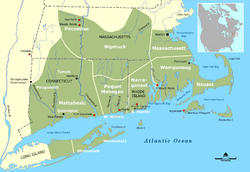This article has multiple issues. Please help improve it or discuss these issues on the talk page. (Learn how and when to remove these messages)
|
 Location of the Massachusett and related peoples of southern New England. | |
| Regions with significant populations | |
|---|---|
| Languages | |
| English, formerly Massachusett language | |
| Religion | |
| Christianity (Puritanism), Indigenous religion, Algonquian religion. | |
| Related ethnic groups | |
| Nipmuc, Wampanoag, Narraganasett, Mohegan, Pequot, Pocomtuc, Montaukett and other Algonquian peoples |
The Massachusett were a Native American tribe from the region in and around present-day Greater Boston in the Commonwealth of Massachusetts. The name comes from the Massachusett language term for "At the Great Hill," referring to the Blue Hills overlooking Boston Harbor from the south.[1]
As some of the first people to make contact with European explorers in New England, the Massachusett and fellow coastal peoples were severely decimated from an outbreak of leptospirosis circa 1619, which had mortality rates as high as 90 percent in these areas.[2] This was followed by devastating impacts of virgin soil epidemics such as smallpox, influenza, scarlet fever and others to which the indigenous people lacked natural immunity. Their territories, on the more fertile and flat coastlines, with access to coastal resources, were mostly taken over by English colonists, as the Massachusett were too few in number to put up any effective resistance.
Missionary John Eliot converted the majority of the Massachusett to Christianity and founded praying towns, where the converted Native Americans were expected to submit to the colonial laws and assimilate to European culture, yet they were allowed to use their language. Through intermediaries, Eliot learned the Massachusett language and even published a translation of the Bible. The language, related to other Eastern Algonquian languages of southern New England, slowly faded, ceasing to serve as the primary language of the Massachusett communities by the 1750s. The language likely went extinct by the dawn of the 19th century.
The last of Massachusett common lands were sold in the early 19th century, loosening the community and social bonds that held the Massachusett families together, and most of the Massachusett were forced to settle amongst neighboring European Americans, but mainly settled the poorer sections of towns where they were segregated with Black Americans, recent immigrants and other Native Americans. Surviving Massachusett assimilated and integrated into the surrounding communities.
- ^ Massachusetts Historical Commission (1982). "Historic and Archaeological Resources of the Boston Area" (PDF).
- ^ Cite error: The named reference
snodgrasswas invoked but never defined (see the help page).